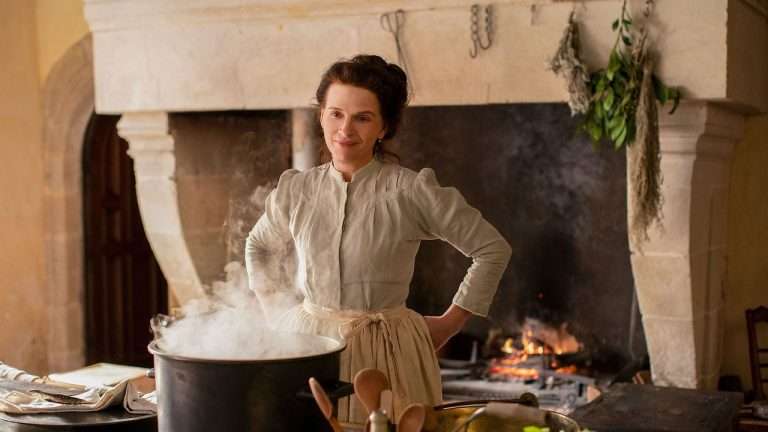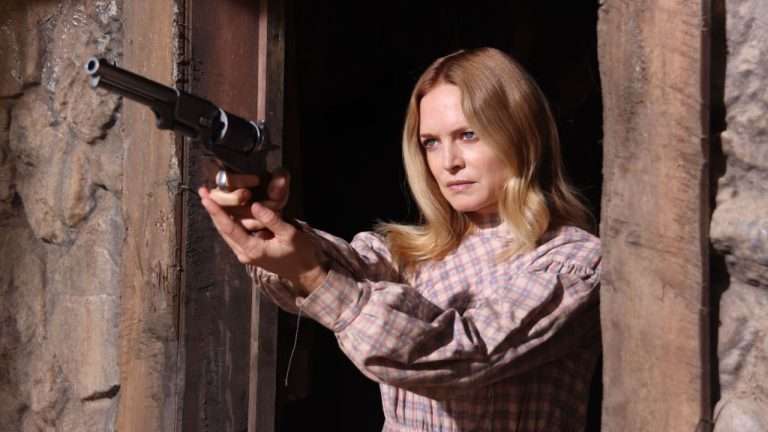We’re used to seeing Super 8 footage at the beginning of drama movies. In almost every case, the squares of grainy film stock represent happy times with happy families. Rarely do we see an entire movie shot with it, and rarer still does it fail (deliberately) to evoke a nostalgic mood. Instead, Haar’s feature-long Super 8 footage feels cold and removed (if still exceedingly pretty). However, this isn’t a criticism as filmmaker Ben Heckling purposefully employs an icy atmosphere to mirror the protagonist’s alienation—not just in the foreign city of Budapest, but in her life.
This glassy-eyed ambiance—perfectly embodied by Kate Kennedy—also ties in with the title, Haar, which refers to a chilly mist found in Scotland and parts of Northern England. In Haar, Jef is the fog, disconnected and confused about her life and its mounting obstacles. Her job as a TV producer is fitting, and Jef easily slips into the stereotype of her career choice: friendly enough for the social aspect but always busy, constantly distracted, always leaving people behind.
“It all just feels kind of temporary anyway,” Jef’s ex-coworker puts it, unsure whether to commit to a relationship because everyone moves so quickly in this line of business. What’s the point? Jef is only half listening to the conversation. In fact, everyone at the party–everyone in the movie–is talking rather than to each other, and no one is really listening.
This lack of connection (alongside some daddy issues) is at the crux of Jef’s problems, even if she refuses to recognize it at first. Even her romantic life is disconnected, as Jef’s American lover talks to her through a screen on Facetime, never quite finding the vocabulary to turn her on during (awkward, cold, lonely) phone sex, and leaving her suddenly, unsatisfied, disappointed, and alone. Jef is so lonely she asks her taxi driver to stay the night to look after her while she’s drunk, and László (Balázs Czukor) turns out to be the only connection she makes in the city.
Before this, we follow Jef on her 24-hour odyssey and final day in Budapest. Several issues crop up, from canceled flights to potential pregnancy to her father’s death. After various strangers point out her urgent lifestyle (“always on the phone, always running around. Work, work…” and, when she remarks on the weather not being this cold yesterday, László replies, “It was, you just didn’t notice,”), Jef finally takes a moment to sit down and enjoy a sandwich. We watch her eat in real-time, as most of the movie is, lingering on a headshot that takes its time in the same way Jef finally lets herself too. Then, yet another phone call, this time with the news her father had died from three heart attacks “out of the blue.”
These constant blows start to break down even a woman as detached as Jef, who hesitates before answering every “Are you okay?” she’s asked. In a tame version of Aneil Karia’s day-in-the-life drama Surge (2021), Jef breaks down and falls into crisis, fainting at sudden moments and getting sloppy drunk. Heckling’s mute, humble, and occasionally sweet character study is heavy with suppressed emotion, all of which Kennedy carries on her shoulders for the 80-minute runtime. Anything she drops behind is picked up by Czukor, the two delivering a poignant final scene that almost makes up for what the narrative lacks. The feeling of distance is an intentional one, but it can sometimes leave Haar coming off as slow and disjointed. The extreme minimalist aspect means the final effect could have probably been achieved in half the time.
Nonetheless, Haar is a beautifully shot character essay that feels like if you put Phoebe Waller-Bridge’s Fleabag (2016) into Joanna Hogg’s The Souvenir (2019), flecked with moments of sarcastic female humor. The closing monologue heats the bitter tone to a lukewarm finish, giving us context to Jef’s strained relationship with her father. We’re also given a reflective mediation on the idea of memory, something Jef describes as “scratchy” and “organic,” reminiscent of Christopher Nolan’s famous Memento (2000) quote: “Memory can change the shape of a room; it can change the color of a car.
And memories can be distorted. They’re just an interpretation.” Only after her father’s death is Jef able to re-interpret a sad childhood scene that she misremembered, and through this loving restoration, she is able to find forgiveness for him. Now that she’s finally spoken about the things she’s been experiencing—finally put down her baggage and connected to someone—she’s able to leave the city like a ghost tying up their unfinished business.
Haar is a small-scale project that was no doubt difficult to achieve, but the painstaking use of film stock is certainly worth it. A labor of love, Haar exhibits a passion for craftsmanship, which should be congratulated, even if we can feel as disconnected as Jef does at times. In conversation with New Wave cinema, Haar feels like a more familiar and feminine response to Mark Jenkin’s Bolex-filmed Bait (2019), embracing lens flares, film scratches, and all.




![Game Of Death [2017]: Fantasia Film Festival Review](https://79468c92.delivery.rocketcdn.me/wp-content/uploads/2017/07/GOD-3--768x432.png)

![Wildland [2020]: ‘Fantasia’ Review – Danish ‘Animal Kingdom’ is about the vicious circle of violence](https://79468c92.delivery.rocketcdn.me/wp-content/uploads/2020/08/Wildland-Movie-Review-highonfilms-3-768x442.jpg)

